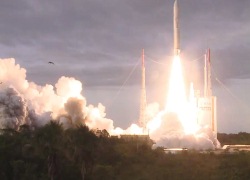Businesses expect industrial IoT to boost their revenues by US$154mn, Inmarsat study finds

The Industrial Internet of Things (IIoT) is set to make a sizeable contribution to the economy by 2023. This is according to a new global study launched by the mobile satellite communications company,
Inmarsat which found that organisations, across the global supply chain, expect IIoT to be increasing their annual revenues by 10% within five years.
The Industrial Internet of Things is set to revolutionise how businesses function in the next few years. There will be significantly increased automation and operational efficiency through the use of real time data and machine-to-machine communication right across the planet.
Access to reliable and resilient connectivity, particularly in remote regions or at sea, where terrestrial networks are not available but satellite communications are available, will be essential to the success of many IIoT deployments.
These latest results have emerged from the 2018 edition of Inmarsat’s research programme into IIoT trends – ‘IIoT on Land and at Sea’ – for which market research specialist Vanson Bourne surveyed 750 businesses with a combined turnover of $1.16 trillion (€0.99 trillion) from across the globe. Respondents were drawn from a wide range of industries, including the agriculture, energy, maritime, mining and transport sectors.

Paul Gudonis
Commenting on the findings, Paul Gudonis, president, Inmarsat Enterprise, said: “IIoT is emerging as a major force in the modern enterprise and it’s clear that businesses are prioritising satellite technology to transform their operations and achieve competitive advantage.
Data generated by IIoT infrastructure is expected particularly to bring greater transparency to the global supply chain, allowing businesses to automate processes, reduce operational waste and speed up rate of production, leading to higher revenues and lower costs”.
“However, many businesses are struggling with security, skills and connectivity challenges in large scale IIoT deployments. Over half (56%) require additional cyber-security skills and 34% don’t yet have access to the connectivity they need. For global businesses that require a global communications network, satellite connectivity will play a key role, guaranteeing constant secure data transmission wherever their IIoT infrastructure is located,” he concluded.
Inmarsat is the provider of mobile satellite connectivity to IIoT deployments across the global supply chain. Our services are enabling end-to-end transparency across the production, extraction, manufacture and multi-modal transportation of goods, delivering operational efficiencies to organisations from the agriculture, energy, maritime, mining and transport sectors.
To view the research microsite and download the full report – ‘IIoT on Land and at Sea’ – Click here
Comment on this article below or via Twitter @IoTGN
